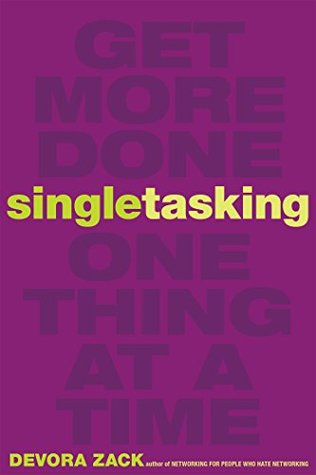Singletasking Summary
5 min read ⌚

Get More Done One Thing at a Time
You can fool yourself, but you can’t really fool us: you are not exactly reading this! Because, reading requires both focused effort and analytical state of mind – and you’re not giving a fair chance at either at this moment.
Why would we say that?
Well, because you’re probably reading this while browsing Facebook or with headphones over your ears. And, that’s basically the same as not reading it.
Still convinced that you’re good at multitasking?
Let Devora Zack teach you a thing or two.
Who Should Read “Singletasking”? And Why?
The message of this book is quite simple: multitasking doesn’t work. The fact that you’re doing it and you’re still successful doesn’t mean the opposite. It probably means that you don’t have enough time to do anything else. And that you’ll finish twice as more if you start to singletask.
So, if you’re tired of multitasking, this book should come in handy to you. Read it, however, even in the opposite case. If we are to believe Zack, multitasking is biologically impossible.
So, either you are wasting yourself, or you are a freak of nature.
About Devora Zack
Devora Zack is an American leadership and networking expert. A magna cum laude Penn University graduate, Zack holds an MBA from Cornell and is a certified neuro-linguistic programming trainer.
is an American leadership and networking expert. A magna cum laude Penn University graduate, Zack holds an MBA from Cornell and is a certified neuro-linguistic programming trainer.
She is the CEO of Only Connect Consulting, Inc., a company with a more than attractive portfolio, featuring 100+ clients in almost all major business sectors.
“Singletasking” is her most recent book. Both of her previous works, “Networking for People Who Hate Networking,” and “Managing for People Who Hate Managing” have been lauded and awarded by numerous publications.
“Singletasking Summary”
Let’s get straight to the point:
Multitasking doesn’t exist. We’re not saying that, and, for that matter, Zack isn’t saying it either. It’s once again, time-proof good-old science spreading the news.
Namely, what you’re referring to as multitasking is, actually, “task-switching.” In other words, instead of doing many things at the same time, you’re still doing them one at a time, though switching quickly from one task to another.
How quickly?
Scientists have done the research and they have concluded that it’s probably no more than a tenth of a second.
To put that into laymen’s terms: it’s a rollercoaster ride what’s happening in your brain, it is. And it is not doing you any favors in terms of your health either.
Namely, multitasking – or, let’s call it by its real name, task-switching – shrinks your brain. No, we’re not joking: your prefrontal cortex actually reduces in size when you’re doing many things at the same time. It’s his way to say:
“I’ve had just about enough with this overload. I’m going back into my room and I’m locking the door. And no one is allowed until I get a list of priorities!”
Now, why would you do this to your brain? Are you a tyrant or something?
Of course, you’re not!
And that’s why it’s time to lend us an ear!
We have one word for you: singletask.
It is still underlined in red by your Microsoft Word dictionary. So, it is your job to make it trendy enough so that it deserves a place in non-custom vocabularies.
How?
Just follow these few simple steps.
First of all, reduce the time you spend on time-consuming apps such as Facebook. Start by shutting off all social media notifications immediately.
Secondly, learn to take short breaks: singletasking requires focus, and focus requires energy.
Speaking of which, your mind will be wandering from time to time; put down in writing everything that can wait. You’ll come back to it later.
Don’t forget that it’s a jungle out there, so no matter how hard you try, the other people will not let you focus. Teach them: make yourself unavailable, either by muting your phone or locking your door.
Also, clustertask! Group similar task together and complete them in a single go.
Finally, be a good listener. Whether you’re in a meeting or taking a walk with a friend – practice singletasking by not even taking your phone with you.
In time – you’ll see – you’re not going to need it.
Except when you actually need it.
Key Lessons from “Singletasking”
1. Multitasking Is Actually Task-Switching
2. Multitasking Shrinks Your Brain
3. Singletask Yourself Back in the World of Human Relations
Multitasking Is Actually Task-Switching
The next time you hear somebody using the word “multitasking,” just stop him and throw at him few science-based pieces of information right out of Zack’s book.
First and foremost, say to him, multitasking doesn’t exist. Your brain is not capable of doing few things at the same time, so stop living in the illusion that it is. It’s like you’re telling me that you can watch five TV channels at the same time, even though your TV doesn’t have a PiP function!
What’s really happening is that you’re just switching fast and easy between tasks. It doesn’t help you with your assignments, though. You’re neither more productive nor more precise.
So, let’s get one thing straight: multitasking is task-switching. And…
Task-Switching Shrinks Your Brain
It does! It really does. Scientists have noticed that the prefrontal cortex of people who multitask is, on average, smaller than the prefrontal cortex of those who don’t.
Because, all challenging tasks happen in your prefrontal cortex. It’s not like you’re washing the dishes and listening to music! It’s like you’re counting money and talking to somebody about the results of last night’s football matches.
Can’t do it, can you?
Well, your brain says that he, for one thing, won’t anymore.
Singletask Yourself Back in the World of Human Relations
Multitasking isn’t only bad for your health. It’s also bad about your relationships. It’s because of it you’re unable to focus on the person standing next to you.
When you start singletasking, you’ll see how this will change your social life for the better as well. No more urges to accept a phone call in the middle of a conversation, no more glances at your mobile phone every ten minutes or so.
Just the miracle of the oh so simple and tender, so profoundly beautiful interhuman communication.
Like this summary? We’d Like to invite you to download our free 12 min app, for more amazing summaries and audiobooks.
“Singletasking” Quotes
By immersing yourself in one task at a time, one moment at a time, you’ll accomplish more while enjoying deeper, stronger relationships. Share on X Multitasking is misleading. Rather than mitigating demands, it magnifies our problems. Our brains are incapable of honing in on more than one item at a time. Share on X Multitasking weakens our ability to concentrate. We are collectively losing the ability to sustain prolonged attention. Share on X It is all too easy to replace inward examination with external distractions. Share on X Dedicating a mere three to five minutes at the start of each workday to organizing your to-do list can transform your entire day into one that is proactive rather than reactive. Share on XOur Critical Review
“Singletasking” is as straightforward as a book can get. It has only one message and it spends half of its pages to set the grounds for a theory defending it, with the other half spent on practical ways to implement it.
One could say that the book isn’t as innovative as Zack would have you believe. Moreover, it isn’t actually a book, but somewhat drawn-out magazine article.
Even so, the power and the importance of its message makes it an almost indispensable read for any millennial. Because, otherwise, the future of our minds may be a bit bleak.
Emir is the Head of Marketing at 12min. In his spare time, he loves to meditate and play soccer.







